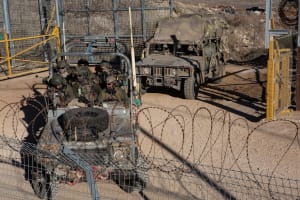Iran's influence in South America – The Islamic Republic’s use of trade with Latin America to reduce impact of sanctions
Read the first in a multi-part series analyzing Iranian interests in South America and how they relate to Israel and US

The announcement in July by the Iranian Defense Ministry of a Memorandum of Understanding between the Islamic Republic of Iran and Bolivia, and the dispatch of a commercial attaché to Brazil, highlights Iran’s global interests once again.
However, the focus of Iran on South America might not seem obvious at first glance.
Iran’s interest in South America goes back to the Persian government under the Shah, who developed ties in South America over oil production.
Since the Islamic Revolution in 1979, Iran has worked to build political, cultural, commercial and military ties with revolutionary Marxist countries in Latin America, such as Cuba, Bolivia, Nicaragua, and recently Venezuela, countries that are hostile towards the United States.
More concrete efforts to develop ties through high-level official visits began under Iranian President Mohammad Khatami and intensified under former President Mahmoud Ahmadinejad.
Ahmadinejad, the head of Iran from 2005 to 2013, focused primarily on nations that already had tensions with the United States.
Analyst Stephen Johnson, writing for the Center for Strategic and International Studies, says the Iranian regime “has sought foreign partners to project an image of global power, expand trade, intertwine its finances more tightly into the international banking system, and forge political alliances.”
He notes that some Latin American countries increased ties with Iran to “strengthen their own efforts to counter U.S. influence and validate their models of personal, centralized control.”
Marta Lucía Ramírez, Colombia's former National Defense and Foreign Trade minister, has spoken about “Latin America’s growing distance from its traditional ally, the United States” as it pursues increased ties with Iran.
She warned that Ecuador and Bolivia “may soon replace Venezuela as Iran’s most important strategic partners in the region.”
Iran has been interested in growing trade relations with sympathetic countries to offset the trade ties that were cut or reduced following the Islamic Revolution in 1979. In the mid-1980s, another round of sanctions was imposed on Iran due to its support for terrorism. Those punitive efforts have only intensified with the imposition of sanctions over Iran’s illegal nuclear program, starting in 2006, when Iran refused to comply with the UN Security Council Resolution 1696.
Iran also initiated several trade and banking projects in Latin America to evade U.S. sanctions or minimize their impact on the Iranian economy.
While not all of these projects have been successful, Venezuela and Bolivia have continued to engage in various deals with Iran. Venezuela, in particular, has increased its partnership with Iran as it, too, has come under U.S. sanctions.
No doubt, Iran’s strongest relations and greatest financial investments in recent years have been with Venezuela.
According to Stephen Johnson, Iran’s repeated investments in Venezuela have been as much about keeping a valuable partner, and doorway into the region afloat, as they have been about receiving a financial return on investment.
“It would be much harder for Tehran’s plans to succeed if the Maduro regime collapsed. Hence the Iranian focus on assisting Venezuela’s oil industry, which supplies 90% of the country’s income to fund social programs and maintain a large army,” Johnson wrote in Foreign Policy (FP) magazine.
“If the dictatorship in Venezuela fails, Cuba and Nicaragua could be next, taking out Iran’s remaining Western Hemisphere partners in thwarting U.S. influence.”
As a founding OPEC member, along with Iran, Venezuela has backed efforts to undermine the American petrodollar. In 2005, then-President Hugo Chavez announced he was ready to move his country’s foreign exchange holdings from dollars to euros. He called for the creation of a South American central bank to challenge U.S. control over trade in Latin America.
While Iran has worked to increase non-oil trade in South America, oil is still its primary material export. Due to sanctions and embargoes, restricting much of Iran’s oil trade, the Islamic Republic is seeking to grow non-oil trade in Latin American countries, as it has done with Venezuela.
According to the Financial Tribune, an Iranian English-language financial news site, Iran increased its non-oil trade with Venezuela by 416% in the 2022-23 fiscal year.
Indeed, Iranian President Ebrahim Raisi’s visit to Latin America in June was partially to “open new paths for Iran economically.”
In particular, Iran hopes to renew trade with Cuba and Nicaragua, two countries on Raisi’s itinerary that once had regular trade with Iran. There has been limited to no trade with those countries over the past decade.
Another, more recent partner in broadening Iranian trade in South America and working to reduce U.S. hegemony in the region, is Brazilian President Luiz Lula da Silva.
Da Silva (Lula), recently re-elected after a controversial race, maintained very friendly relations with Iran in his previous term, hosting former Iranian President Mahmoud Ahmadinejad, and visiting Tehran. Lula also opposed sanctions against Iran over its nuclear program.
The Brazilian president has also been a proponent of widening the BRICS (Brazil, Russia, India, China, and South Africa) trade organization to include Iran. The Iranian regime has indicated its interest in joining BRICS as a means of countering Western sanctions over its nuclear program.
Iranian top leader Raisi was invited to the 15th BRICS Summit in South Africa as a special guest. And the country was officially invited to join the trade group during the summit.
However, Iran is interested in Latin America for more than just economics.
Former Venezuelan president Chavez openly advocated for Iran’s nuclear program, and even boasted of helping the mining industry in Iran. In 2008, Venezuela granted the Iranian Impasco mining firm the rights to mine in an area known for iron, bauxite, gold and uranium ore.
In 2010, FP magazine ran a piece about Chavez’s collaboration with Iran which detailed the subterfuge used by Iran and Venezuela to hide the extent of their cooperation.
It exposed that a “cement plant” run by Impasco was, in fact, processing uranium ore, while a “tractor factory,” being operated as a joint Venezuela-Iran venture, was actually producing military explosives.
A later report by the Gatestone Institute claimed that many underperforming cooperative industrial projects between Iran and Venezuela were aimed at constructing “a covert procurement and acquisition network in Latin America.” The businesses were never meant to succeed, they merely provided a cover for the acquisition of sanctioned items.
Many of those investments in Latin America failed to produce the desired results, often due to rampant corruption in the Latin American regimes, or a shift toward more lucrative mineral rights deals with China or Germany.
However, Iran’s interest in Latin America is not just about gaining sanctions relief or forming ideological partnerships. Iran’s primary export is not oil, but its revolutionary ideology.
In the next section, we will look at how Iran has spread its terror ideology to South America, even growing a Spanish-language media empire in Latin American countries to distribute its revolutionary ideology: Shia Islam and anti-Israel propaganda.

J. Micah Hancock is a current Master’s student at the Hebrew University, pursuing a degree in Jewish History. Previously, he studied Biblical studies and journalism in his B.A. in the United States. He joined All Israel News as a reporter in 2022, and currently lives near Jerusalem with his wife and children.













